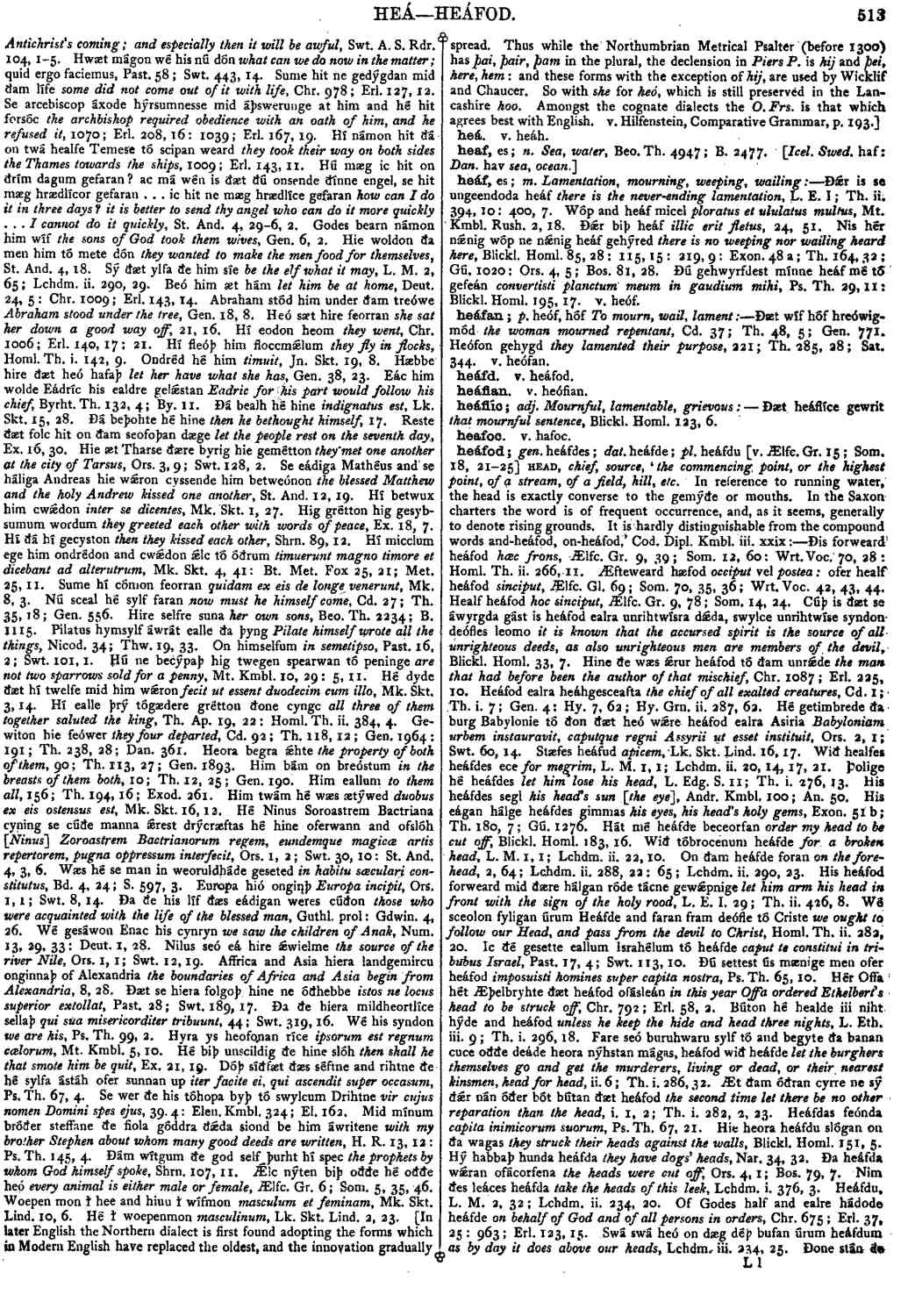heáfod
- noun [ neuter ]
-
Ðis forweard heáfod
hæc frons,
- Ælfc. Gr. 9, 39; Som. 12, 60: Wrt. Voc. 70, 28: Homl. Th. ii. 266,
11.
-
Æfteweard hæfod occiput vel postea: ofer healf heáfod
sinciput,
- Ælfc. Gl. 69; Som. 70, 35, 36; Wrt. Voc. 42, 43, 44.
-
Healf heáfod
hoc sinciput,
- Ælfc. Gr. 9, 78; Som. 14, 24.
-
Cúþ is ðæt se áwyrgda gást is heáfod ealra unrihtwísra dǽda, swylce unrihtwíse syndon deófles leomo
it is known that the accursed spirit is the source of all unrighteous deeds, as also unrighteous men are members of the devil,
- Blickl. Homl. 33, 7.
-
Hine ðe wæs ǽrur heáfod tó ðam unrǽde
the man that had before been the author of that mischief,
- Chr. 1087; Erl. 225, 10.
-
Heáfod ealra heáhgesceafta
the chief of all exalted creatures,
- Cd. 1; Th. i. 7; Gen. 4: Hy. 7, 62; Hy. Grn. ii. 287,
62.
-
Hé getimbrede ða burg Babylonie tó ðon ðæt heó wǽre heáfod ealra Asiria
Babyloniam urbem instauravit, caputque regni Assyrii ut esset instituit,
- Ors. 2, 1; Swt. 60, 14.
-
Stæfes heáfud
apicem,
- Lk. Skt. Lind. 16, 17.
-
Wið healfes, heáfdes ece
for megrim,
- L. M. 1, 1; Lchdm. ii. 20, 14, 17, 21.
-
Þolige hé heáfdes
let him lose his head,
- L. Edg. S. 11; Th. i. 276, 13.
-
His heáfdes segl
his head's sun [the eye],
- Andr. Kmbl. 100; An. 50.
-
His eágan hálge heáfdes gimmas
his eyes, his head's holy gems,
- Exon. 51 b; Th. 180, 7; Gú. 1276.
-
Hát mé heáfde beceorfan
order my head to be cut off,
- Blickl. Homl. 183, 16.
-
Wið tóbrocenum heáfde
for a broken head,
- L. M. 1, 1; Lchdm. ii. 22, 10.
-
On ðam heáfde foran
on the forehead,
- 2, 64; Lchdm. ii. 288, 22: 65; Lchdm. ii. 290, 23.
-
His heáfod forweard mid ðære hálgan róde tácne gewǽpnige
let him arm his head in front with the sign of the holy rood,
- L. E. I. 29; Th. ii. 426, 8.
-
Wé sceolon fyligan úrum Heáfde and faran fram deófle tó Criste
we ought to follow our Head, and pass from the devil to Christ,
- Homl. Th. ii. 282, 20.
-
Ic ðé gesette eallum Israhélum tó heáfde
caput te constitui in tribubus Israel,
- Past. 17, 4; Swt. 113, 10.
-
Ðú settest ús mænige men ofer heáfod
imposuisti homines super capita nostra,
- Ps. Th. 65, 10.
-
Hér Offa hét Æþelbryhte ðæt heáfod ofásleán
in this year Offa ordered Ethelbert's head to be struck off,
- Chr. 792; Erl. 58, 2.
-
Búton hé healde iii niht hýde and heáfod
unless he keep the hide and head three nights,
- L. Eth. iii. 9; Th. i. 296, 18.
-
Fare seó buruhwaru sylf tó and begyte ða banan cuce oððe deáde heora nýhstan mágas, heáfod wið heáfde
let the burghers themselves go and get the murderers, living or dead, or their nearest kinsmen, head for head,
ii.- 6; Th. i. 286, 32.
-
Æt ðam óðran cyrre ne sý ðǽr nán óðer bót bútan ðæt heáfod
the second time let there be no other reparation than the head,
i.- 1, 2; Th. i. 282, 2, 23.
-
Heáfdas feónda
capita inimicorum suorum,
- Ps. Th. 67, 21.
-
Hie heora heáfdu slógan on ða wagas
they struck their heads against the walls,
- Blickl. Homl. 151, 5.
-
Hý habbaþ hunda heáfda
they have dogs' heads,
- Nar. 34, 32.
-
Ða heáfda wǽran ofácorfena
the heads were cut off,
- Ors. 4, 1; Bos. 79, 7.
-
Nim ðes leáces heáfda
take the heads of this leek,
- Lchdm. i. 376, 3.
-
Heáfdu,
- L. M. 2, 32; Lchdm. ii. 234, 20.
-
Of Godes half and ealre hádode heáfde
on behalf of God and of all persons in orders,
- Chr. 675; Erl. 37, 25: 963; Erl. 123, 15.
-
Swá swá heó on dæg déþ bufan úrum heáfdum
as by day it does above our heads,
- Lchdm, iii. 234, 25.
-
Ðone stán ðeæt his heáfdum læg
the stone that lay at his head,
- Past. 16, 3; Swt. 101, 16.
-
Ðá cóman ðyder tu wild deór and heóldan ðone líchoman óðer æt ðǽm heáfðum óðer æt ðǽm fótum
then came thither two wild beasts and guarded the body, one at the head, the other at the feet,
- Shrn. 83, 25: Rood Kmbl. 126; Kr. 63.
-
Heáfdan,
- Blickl. Homl. 145, 26.
- [Laym. heaved, hæfed: Orm. hæfedd: A. R. heaved: Piers P. Chauc. Wick. hed, heed. The cognate dialects seem to offer two forms, differing in the root vowel, each of which may be represented in the English. Thus heáfod may compare with Goth. haubiþ: O. Sax. hóƀid: O. H. Ger. haupit, houbit; while hæfod,,]
Bosworth, Joseph. “heáfod.” In An Anglo-Saxon Dictionary Online, edited by Thomas Northcote Toller, Christ Sean, and Ondřej Tichy. Prague: Faculty of Arts, Charles University, 2014. https://bosworthtoller.com/18245.
Checked: 0